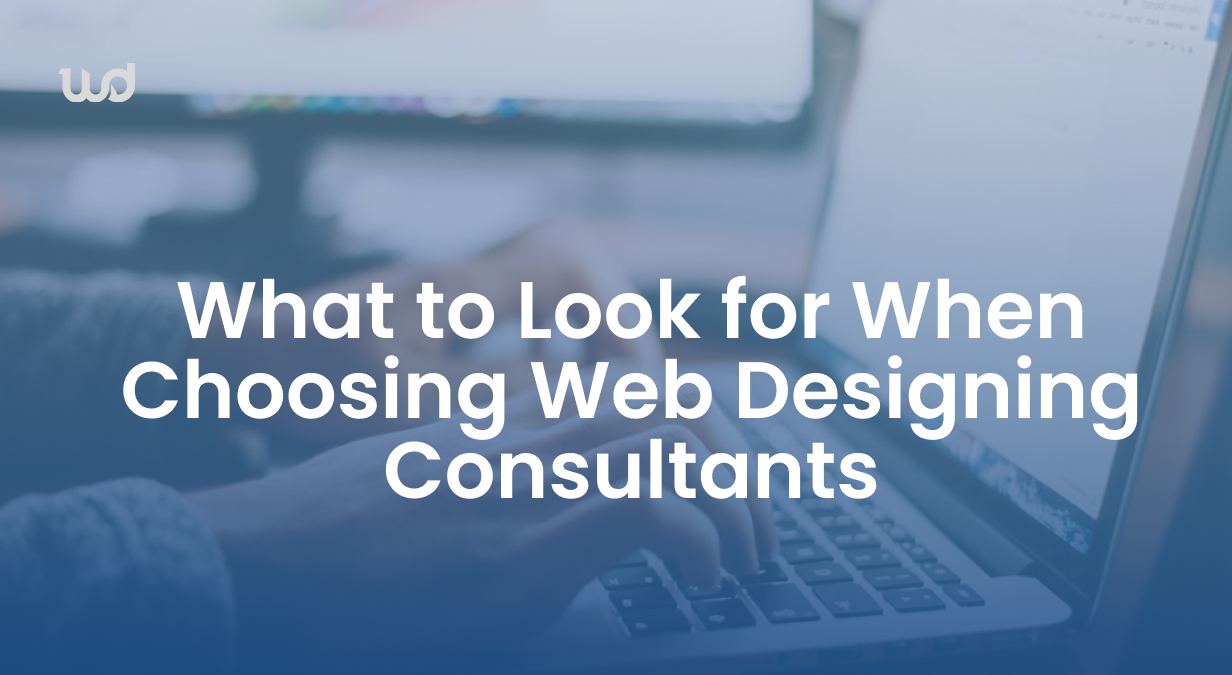What to Look for When Choosing Web Designing Consultants

When it comes to building a strong online presence, choosing the right web designing consultants is a crucial step. The internet is saturated with businesses competing for attention, and a well-designed website can be your ticket to be considered the best in your industry. But how do you choose the right consultants for your project? This Website Digitals blog post explains everything you should consider, helping you make an informed decision that ensures your website reflects your brand and achieves your goals.
Why You Need Professional Web Designing Consultants
Let’s address why hiring web designing consultants is so essential before making the decision of selection. Here’s what they bring to the table:
- Expertise: Experts have the knowledge and understanding to design websites that are both aesthetically pleasing and practical for users.
- Customization: They tailor your website to meet your specific needs, ensuring it resonates with your target audience.
- SEO Optimization: An experienced consultant knows how to structure and design a site that ranks well in search engines.
- Time-Saving: Assigning web design to experts frees you up to focus on other aspects of your business.
Types of Web Designing Consultants
When taking the step to hire web designing consultants, it’s essential to understand the different types available. Each type caters to specific project needs, budgets, and preferences, so knowing the distinctions can help you make the best choice for your business. Below, we break down the three primary types of web designing consultants:
1. Freelancers
Freelancers are independent professionals who specialize in web design. They are ideal for businesses or individuals with smaller projects or limited budgets.
Key Features:
- Cost-Effective: Freelancers often charge lower fees than agencies, making them a budget-friendly option.
- Personalized Attention: With freelancers, you work directly with the designer, ensuring a clear communication line.
- Specialization: Many freelancers focus on niche areas, such as e-commerce, portfolio websites, or minimalist designs.
Considerations:
- Limited Bandwidth: Freelancers may display fake multiple projects, potentially affecting turnaround time.
- Scope of Services: They may lack access to additional services like SEO, content creation, or advanced technical support.
2. Web Design Agencies
Agencies are professional firms with teams of experts who collectively handle all aspects of web design and development. They are an excellent choice for medium to large projects or businesses that require a comprehensive online presence.
Key Features:
- Full-Service Solutions: Agencies often offer additional services such as branding, digital marketing, and maintenance.
- Team Collaboration: A group of specialists—designers, developers, content writers—works together on your project.
- Scalability: Agencies are equipped to handle complex or large-scale projects with advanced functionality.
Considerations:
- Higher Costs: Agencies tend to charge more due to their team structure and additional resources.
- Process-Oriented: They follow strict workflows, which may require longer timelines for completion.
3. In-House Teams
An in-house web design team consists of designers and developers assigned directly by your company. This option is suited for organizations that need ongoing design work or frequent updates to their website.
Key Features:
- Immediate Access: The team is always available for quick changes, updates, or feedback.
- Brand Consistency: In-house teams are deeply familiar with your brand, ensuring designs align perfectly with your identity.
- Custom Workflows: Processes are tailored to your company’s needs and preferences.
Considerations:
- High Overhead: Maintaining an in-house team requires significant investment in salaries, tools, and training.
- Limited Exposure: Since the team works exclusively for your company, they may lack exposure to diverse design trends and technologies.
Which Type is Right for You?
The type of web designing consultant you choose should align with your project’s size, budget, and goals. For small, short-term projects, freelancers are a great choice. If you need an all-inclusive solution for a larger or more complex website, a web design agency might be your best bet. Meanwhile, businesses with constant design needs and good resources should consider building an in-house team.
Key Factors to Consider When Hiring Web Designing Consultants
Finding the right web design consultant can be challenging, but breaking it down into the following categories can simplify the process:
1. Experience and Portfolio
Start by assessing the consultant’s experience and portfolio. Look for:
- Years in the Industry: A consultant with a proven track record is more likely to deliver quality work.
- Variety of Projects: A diverse portfolio showcases their ability to adapt to different industries and styles.
- Relevance: Have they collaborated with companies like yours? This can indicate whether they understand your specific needs.
Checklist:
- Review their portfolio on their website or request samples.
- Check for clean layouts, intuitive navigation, and mobile responsiveness.
2. Technical Expertise
Your chosen consultant should be proficient in the technical aspects of web design, such as:
- Responsive Design: Guarantees that your website appears stunning on every device.
- Coding Languages: Knowledge of JavaScript, CSS, HTML, and frameworks such as Bootstrap.
Content Management Systems (CMS): Experience with WordPress, Shopify, or other CMS platforms.
Key Technical Skills to Look For
|
Skill |
Importance |
Why It Matters |
|
Responsive Design |
High |
Mobile traffic is over 50% of total web traffic. |
|
CMS Proficiency |
Medium to High |
Easier updates and management of your site. |
|
SEO Knowledge |
High |
Ensures your website ranks well in search results. |
|
Loading Speed Optimization |
High |
Slow websites drive users away. |
3. Communication and Collaboration
A good consultant will prioritize communication. Pay attention to:
- Responsiveness: How fast do they handle your queries?
- Clarity: Do they explain technical details in a way you can understand?
- Collaboration: Are they receptive to your suggestions and comments?
Tips:
- Schedule a consultation call to assess their communication style.
- Ask if they offer progress updates during the design process.
4. Cost and Budget
Understanding the web design consulting cost is a critical part of your decision-making process. While affordability matters, don’t compromise on quality.
- Transparent Pricing: Look for consultants who provide a detailed breakdown of costs.
- Flexibility: Some consultants may offer package deals or custom pricing based on your project’s scope.
Questions to Ask:
- Are there any hidden fees, such as for revisions or hosting?
- How do they handle payment—flat rate, hourly, or milestone-based?
5. Additional Services
Some web design consulting services go beyond design, offering added value:
- SEO Optimization: Enhances your website’s presence on search engines.
- Content Creation: Assistance with crafting engaging website copy.
- Maintenance Packages: Ongoing updates, backups, and support.
Look For:
- Bundled services that can save time and money.
- Consultants with expertise in both design and marketing.
Red Flags to Watch Out For
While there are many talented web design consultant companies, some may not meet your expectations. Here are a few warning signs:
-
Overpromising Results
Be cautious if a consultant guarantees “first-page Google rankings overnight.” This often indicates the use of unethical tactics, such as black hat SEO, which can harm your website’s long-term performance and even lead to penalties from search engines.
-
Lack of a Strong Portfolio
A missing or poorly executed portfolio suggests a lack of experience or success. A reliable consultant should showcase a diverse range of projects that reflect their expertise and ability to meet client needs.
-
Poor Communication Skills
Frequent delays in responses or unclear communication can cause frustration and may indicate challenges in collaboration. Effective communication is essential for ensuring your project stays on track and meets your expectations.
How to Analyze a Web Design Proposal
Once you’ve shortlisted potential consultants, ask them to provide a proposal. Here’s what to look for:
- Project Scope: Comprehensive outline of the tasks to be completed.
- Timeline: Estimated time for completion, including milestones.
- Cost Estimate: Transparent breakdown of expenses.
Assess various proposals to determine which one aligns best with your project requirements and budget.
Conclusion
Choosing the right web designing consultants involves careful research, clear communication, and an understanding of your project needs. By keeping these factors in mind, you’ll be well on your way to creating a website that not only looks stunning but also performs exceptionally. So, take your time, compare options, and make an informed decision that sets your business up for success!







